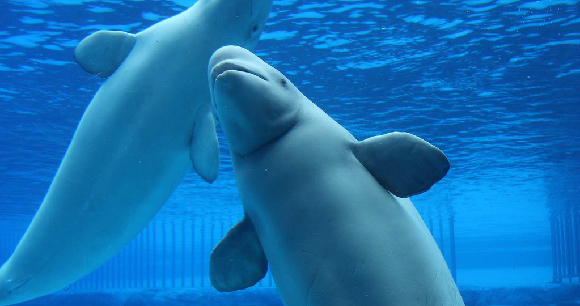
Washington, DC—The Animal Welfare Institute (AWI) and other animal and environmental protection groups applaud the Department of Commerce’s decision to prohibit Mystic Aquarium from breeding five captive-born beluga whales from Canada as part of an import permit issued Friday. The permit also precludes Mystic from training the whales for performance.
The Connecticut aquarium applied for a permit last year to import the belugas from Marineland, a marine theme park in Niagara Falls, Canada, for the purpose of scientific research. Among other research projects, Mystic proposed behavioral and reproduction studies, including breeding and research on pregnant females and their progeny, raising concerns that the real purpose of the import was to perpetuate the captive beluga population for public display in the United States. Moreover, under a partnership between Mystic and Georgia aquariums, three of the whales could eventually be transferred to Atlanta. The permit conditions clarify that the National Marine Fisheries Service (NMFS) must approve any decision to transfer the animals.
In issuing the permit Friday, NMFS authorized seven of Mystic’s eight research projects; it did not authorize the study related to reproduction. The permit conditions prohibit the aquariums from breeding the whales, using them in public interactive programs (such as photo opportunities), or training them for performance.
The permit restrictions come after a group of animal and environmental protection organizations submitted comments in December opposing the permit, outlining their substantive legal and policy objections under the Marine Mammal Protection Act (MMPA). These groups urged the inclusion of the no-breeding and no-performance clauses in a permit if one was issued, as well as the clarification that NMFS—not the permit holder—should make any decisions regarding the disposition of these whales.
NMFS’s decision is indicative of a broader global movement in recent years to end the unsustainable and inhumane cetacean trade and public display. The 2013 documentary “Blackfish” had an enormous impact on the public’s view of captive orcas. That same year, NMFS denied a request by Georgia Aquarium to import wild-caught Russian belugas for public display. In 2016, SeaWorld ended orca breeding at its parks, and, last year, Canada passed a law to phase out the keeping of cetaceans in captivity in the country.
“This latest decision is remarkable because it is the first time that the federal government has placed restrictions on breeding captive cetaceans under the MMPA,” said Dr. Naomi Rose, AWI’s marine mammal scientist. “It marks another step on the path to phasing out cetacean captivity—an industry built on immense animal suffering.”
Before Mystic can import the belugas, the facility must provide NMFS with a detailed contraception plan to prevent breeding, and Canada must issue a permit to export the whales from Marineland.
Canada is currently developing regulatory procedures for issuing export permits for captive cetaceans under its new law and is calling for public submissions; animal advocates support strong and clear requirements in such permits to prohibit breeding and performance. Many countries do not have comparable laws to the MMPA, and Canada must ensure any captive cetaceans exported from the country continue to be covered by Canada’s powerful legislative protections.
Margie Fishman, (202) 446-2128, [email protected]